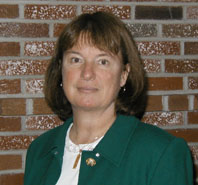 Congresswoman-elect set her own terms. No one thought had a shot. The Democratic Party chairman didn't know her name. And then …
Congresswoman-elect set her own terms. No one thought had a shot. The Democratic Party chairman didn't know her name. And then …DOVER, N.H. — Someday, some brainy PhD student will probably examine the unlikely 2006 campaign of New Hampshire's first elected congresswoman and identify its lessons something like this:
- Ignore pollsters and pundits. Real people are the real experts.
- The best focus group is coffee with six smart friends.
- Listen carefully, even in a gathering of only three people.
- Never underestimate the tenacity of a determined network of middle-aged volunteers, most of them women.
- Always play nice and always send thank-you notes.
Shea-Porter, 53, said her reason had been much the same when she took on what most analysts assumed would be a losing battle. Her goal, she said, was to represent the "bottom 99%" in her state and her country — those Americans who do not worry about the vagaries of the stock market or whether they can afford a bigger yacht, but "whether they will have pizza money for their family on a Friday night."
 The former social worker and community-college politics teacher takes her place in a 53-member freshman congressional class that Shea-Porter describes as a "posse of reformers." In a House election when the average winning campaign cost about $1 million, she ran hers for $206,000. Campaign manager Sue Mayer, a volunteer, is a medieval historian.
The former social worker and community-college politics teacher takes her place in a 53-member freshman congressional class that Shea-Porter describes as a "posse of reformers." In a House election when the average winning campaign cost about $1 million, she ran hers for $206,000. Campaign manager Sue Mayer, a volunteer, is a medieval historian.Shea-Porter ran all of two TV ads. One featured her 82-year-old mother, a rock-solid New Hampshire Republican. Rather than renting expensive offices, the campaign relied on supporters who provided space in their homes.
Shea-Porter said she realized things were getting bad at her house when the stove turned into a campaign literature storage unit.
"I thought, What have I done to my family?" said Shea-Porter, the mother of a college-age daughter and a son in high school. Her husband, Gene, works for the federal government.
She received little attention from the national Democratic Party. The day after the election, which she won with 52% of the vote, party Chairman Howard Dean could not remember all of her last name, though he knew it was hyphenated.
Dean praised Shea-Porter's win as "an entirely grass-roots effort without support from the party, including us."
Her opponent painted her as a wild-eyed liberal whose sole issue was opposition to the Iraq war. Shea-Porter made no secret of her disapproval of the U.S. presence in Iraq — a position that she said put her in the mainstream of American thinking. She once was ousted from an appearance by President Bush in nearby Portsmouth; she was wearing a T-shirt that read "Turn Your Back on Bush."
But Shea-Porter stressed that her objection to the war was only part of what compelled her to challenge Bradley. She said of her desire to end the Iraq war,
It is absolutely upfront and central. But there is also the deficit, healthcare, the economy and the danger of privatization of Social Security.The constant financial struggle of everyday Americans is a perpetual theme that she hears, Shea-Porter said. Just before the election, she and Mayer, her campaign manager, made a nighttime run to the mall because neither of them had anything left to wear, and their saleswoman turned out to be a teacher who made ends meet for her family by working a second job in retail. Shea-Porter says,
People like that get where this country is going economically. They get what is happening to the price of gas, the price of cereal, the price of milk. The people are way ahead of the politicians on this one.In New Hampshire, Shea-Porter worked on the 2004 Democratic presidential campaign of Gen. Wesley K. Clark. After Clark pulled out, she and Mayer took it upon themselves to start watching Bradley more closely.
 They began attending his New Hampshire town meetings, challenging him on his defense of the Iraq war and his support for Social Security privatization. As active members of a political discussion group, both women agreed that the Democrats needed to find someone to run against Bradley.
They began attending his New Hampshire town meetings, challenging him on his defense of the Iraq war and his support for Social Security privatization. As active members of a political discussion group, both women agreed that the Democrats needed to find someone to run against Bradley.But Shea-Porter put partisan politics aside to make two lengthy visits to the Gulf Coast area as a Red Cross volunteer after Hurricane Katrina, sleeping in a shelter at night, handing out food and water bottles by day. Said Shea-Porter: "There's no way to describe what the government did not do."
Her disgust with government inaction before and after the hurricane cemented her decision to run for office.
Bradley also visited the devastated areas. "The difference was, he never talked about it again," she said. "And I could not stop talking about it. Not only did the government abandon people in the Gulf Coast, they abandoned people in every community in America."
With no high-priced consultants, her campaign relied on what George Washington University political sociologist Elizabeth Sherman called a "net roots" combination of networking and grass-roots politics.
This is a real payoff for women's social and political networks. It has been building for a long time — maybe 15 or 20 years. Women used to complain about the old boys' network. But the time has come now where women recognize the force of their own connections.In the long year of her campaign, Shea-Porter said, she and Mayer "completely trusted" her loose but loyal army of supporters to carry her message of reform. She paid no attention to polls, even when days before the election, prognosticators pronounced her defeat a done deal.
 "I always thought I would win, and that if I did, that would be a wonderful thing," she said. "And if I lost, I would go home and introduce myself to my husband and my dog."
"I always thought I would win, and that if I did, that would be a wonderful thing," she said. "And if I lost, I would go home and introduce myself to my husband and my dog."Her family, she said, helped her keep a sense of perspective throughout the race.
"Having teenagers is the secret," she said. "Teenagers will always remind you that you are still the person who should clean the sink. They are not awed by me. I am not awed by me. I haven't been awed by me for the last 53 years, and I don't plan to start getting awed now that I'm going to Washington."
By Elizabeth Mehren, Los Angeles Times Staff Writer
November 26, 2006
November 26, 2006


1 comment:
God, what a great story! I'll be watching her. You go, girl!!
Post a Comment